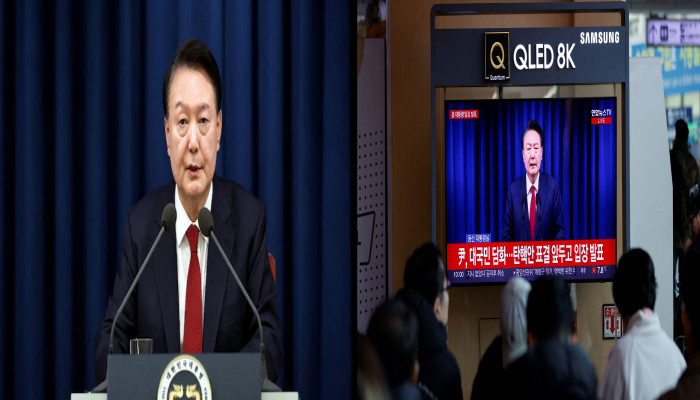South Korean president issues apology, resists resignation ahead of impeachment vote
- In Reports
- 01:37 PM, Dec 07, 2024
- Myind Staff
South Korea’s troubled president apologised on Saturday for the public worry caused by his brief attempt to declare martial law just hours before a parliamentary vote on his impeachment.
In a quick televised speech on Saturday morning, President Yoon Suk Yeol stated that he would not avoid political or legal accountability for the statement and pledged not to try to enforce it again. He declared that he would let his party handle "including matters related to my term in office" as they navigate the nation's political unrest. "The declaration of his martial law was made out of my desperation. However, in the course of its implementation, it caused anxiety and inconveniences to the public. I feel very sorry over that and truly apologise to the people who must have been shocked a lot", Yoon said.
Since taking office in 2022, President Yoon, a conservative, has faced difficulties pushing his agenda through a parliament controlled by the opposition. He has also struggled with low approval ratings amid scandals involving both him and his wife.
In his martial law announcement on Tuesday night, Yoon criticised parliament, calling it a "den of criminals" that is hindering state affairs. He vowed to eliminate what he called "shameless North Korea followers and anti-state forces." A vote in the National Assembly on an opposition-led motion to impeach Yoon is scheduled for Saturday afternoon. However, it's unclear whether the motion will receive the two-thirds majority needed to pass. The opposition parties behind the impeachment motion control 192 out of 300 seats in the legislature, so they need at least eight more votes from Yoon’s conservative People Power Party to succeed.
There were growing calls for the removal of South Korean President Yoon after a leader of his party suggested it on Friday, although the party still officially opposed impeachment. If Yoon were impeached, his powers would be suspended until the Constitutional Court decides whether to remove him from office. If he is removed, a new election would be held within 60 days to find his replacement. Yoon's controversial and poorly planned decision has caused a political crisis in South Korea, disrupting the country's politics and worrying important diplomatic partners like Japan and the US. This situation threatens to remove one of Asia's strongest democratic leaders from office.
On Tuesday night, special forces surrounded the parliament building, and military helicopters flew overhead. However, the military pulled back after the National Assembly voted to overturn the decree, forcing Yoon to lift it by early Wednesday morning. This was the first time in over 40 years that South Korea declared martial law. Since then, thousands of people have demonstrated in Seoul's streets, chanting slogans, waving banners, and dancing and singing along to K-pop songs that have had their lyrics altered to demand Yoon's removal. "We oppose unconstitutional impeachment" was written on signs held by smaller groups of Yoon's supporters during their Friday rally outside the National Assembly.
Opposition lawmakers have accused President Yoon of attempting a self-coup by considering martial law, leading them to draft an impeachment motion with rebellion charges. Lee Jae-myung, leader of the opposition Democratic Party, criticised Yoon’s speech as "greatly disappointing" and said the only solution is for him to either resign or face impeachment. Parliament is set to meet at 5 pm on Saturday. The agenda includes voting on a bill to appoint a special prosecutor to investigate influence-peddling allegations involving Yoon's wife, followed by a vote on impeachment. It remains uncertain whether any members of Yoon’s ruling People Power Party (PPP) will support impeachment. Recently, 18 lawmakers from a minority faction of the party voted unanimously to cancel martial law, which passed with a 190-0 vote. However, the PPP has decided to oppose the impeachment.
Experts believe that if President Yoon were impeached and removed from office, it would cause confusion within the conservative PPP party, making it likely they would lose a presidential by-election to the liberals.
On Friday, Han Dong-hun, the leader of the PPP and head of a faction that helped cancel martial law, suggested suspending Yoon's constitutional powers. He argued that Yoon was unfit for office and might take more extreme actions. However, since Han is not a lawmaker, the party’s official stance is still against impeachment. Han said he received information that during the brief period of martial law, President Yoon ordered the country’s defence counterintelligence chief to arrest and detain certain politicians, accusing them of "anti-state activities."
After Yoon’s televised address, Han repeated his demand for the president to step down, stating that Yoon was not in a condition to perform his official duties. Han told reporters, "President Yoon Suk Yeol must resign soon." Later, Hong Jang-won, the first deputy director of South Korea’s National Intelligence Service, told lawmakers in a private meeting that after declaring martial law, Yoon called him and asked for help from the defence counterintelligence unit to detain key politicians. According to Kim Byung-kee, one of the lawmakers present, those targeted included Han, Lee, and National Assembly speaker Woo Won Shik.
The Defence Ministry announced that Yeo In-hyung, the defence counterintelligence chief, had been suspended. Han claimed that Yoon had given him orders to hold the lawmakers. The commanders of the Special Warfare Command and the Capital Defence Command were also suspended by the government for their role in imposing martial law. Former Defence Minister Kim Yong Hyun, who is accused of suggesting that Yoon enforce martial law, has been placed under a travel ban and is under investigation by prosecutors for rebellion charges. Vice Defense Minister Kim Seon Ho testified in parliament that it was Kim Yong Hyun who ordered troops to be sent to the National Assembly after Yoon declared martial law.







Comments